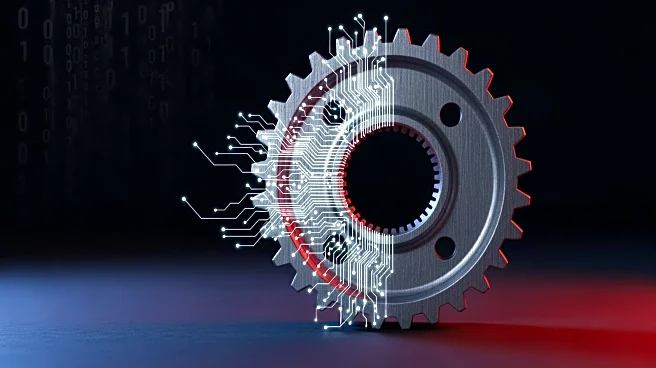What's Happening?
Manufacturers are increasingly targeted by ransomware attacks, with cybercriminals exploiting vulnerabilities in the sector's operational continuity. Notable incidents include Boeing's refusal to pay a $200
million ransom demanded by the LockBit cybercrime group, and Jaguar Land Rover's significant financial losses following a cyber-attack. The manufacturing industry faces an average of 1,585 weekly attacks per organization, a 30% increase from the previous year. State-linked hacking groups, particularly from China, are involved in industrial espionage, while financially motivated ransomware attacks are on the rise. The weakest link in cybersecurity is the supply chain, with unsecured Internet of Things (IoT) devices providing entry points for attackers. AI-enhanced malware and data mining tools are boosting attackers' capabilities, yet only a minority of manufacturing executives feel equipped to handle AI-powered threats.
Why It's Important?
The escalation of ransomware attacks poses a significant threat to the manufacturing sector, impacting production, financial stability, and intellectual property security. As manufacturing is critical to economic stability, disruptions can have widespread consequences. The sector's vulnerability is exacerbated by legacy systems and interconnected supply chains, making it a prime target for cybercriminals. The financial impact is substantial, with companies like Jaguar Land Rover experiencing billions in losses. The need for robust cybersecurity measures is urgent, as cyber resilience becomes a competitive advantage. Manufacturers must prioritize cybersecurity to protect their operations and future business prospects.
What's Next?
Manufacturers are advised to enhance their cybersecurity strategies, focusing on proactive defense and supply chain security. The government has issued guidance to protect against ransomware, emphasizing the importance of cybersecurity as a national security and economic priority. Companies are encouraged to invest in machine learning, generative AI defenses, and application security to mitigate risks. Building resilience into operations and treating downtime as a board-level risk are crucial steps. Manufacturers should enforce cybersecurity standards across vendors and partners, ensuring visibility into access points and third-party risks. The alignment between cybersecurity initiatives and business goals is essential to staying ahead of evolving threats.
Beyond the Headlines
The ethical and legal implications of ransomware attacks are significant, as they threaten intellectual property and national security. The manufacturing sector's reliance on legacy systems and minimal tolerance for downtime highlight the need for modernization and investment in cybersecurity. The rise of AI-enhanced malware underscores the importance of staying ahead of technological advancements in cyber defense. The sector's exposure to state-linked espionage campaigns raises concerns about international relations and the protection of sensitive information. As cyber resilience becomes a competitive advantage, manufacturers must adapt to the changing landscape to safeguard their operations and reputation.










